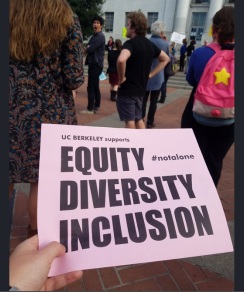In her Ted Talk titled The Power of Vulnerability, Brené Brown defines courage as telling the story of who you are with your whole heart (2010). Conversations around equity, diversity, and inclusion can be vulnerable. But these conversations are crucial. This Engaging Excellence in Equity Fellowship through OCCRL has, in many ways, been a reflective process for me. Individually and collectively, this process has allowed each of the fellows to share:
- our stories about how we arrived at where we are today
- our reasoning as educators and administrators to advocate, create, and maintain spaces in community colleges for underrepresented minority students
- our individual best practices
- our institutional best practices
As a Hawaiian, African-American, Filipino woman who is participating in the Engaging Excellence in Equity Fellowship, my personal story as a woman of color in higher education allows me to connect with the students I serve. I was an older, nontraditional student who worked full time while putting myself through college. I grew up speaking both my native language (Hawaiian) and English. These experiences connect me to the nontraditional and multilingual students I serve at our community college, who may come from minoritized student populations.
In other ways, I do not share in some experiences and have had more privileges than the students I serve. I am a second-generation college student; I come from a family of community educators—a nurse and a behavioral health specialist. As an individual who grew up in Hawaii’s mix of various Asian, Hawaiian, European, and other Pacific Islander cultures, there are times where I have gaps in my personal experience and knowledge of the African American experience in the continental U.S. My lack of these personal experiences is an opportunity for me to gain understanding from other people’s perspectives.
How I use my personal narrative and its relevance to my equity work depends on the student in front of me. A traditional student whose first and only language is English and has a longstanding family tradition of pursuing higher education may not care to know the details of my educational journey. But for the nontraditional and minoritized students I am working with who can see themselves in my story, what I say might make a difference in whether they stay enrolled in classes once they have encountered their first educational roadblock. Or it may encourage them to pursue the career they were told they couldn’t excel at.
Diversity Trainings and Personal Impact
 By 2045, minoritized populations will make up the majority of the United States (Frey, 2018). Community colleges that do not actively engage in diversity, equity, and inclusion conversations, as well as take efforts to increase enrollments and retention rates of minoritized students, will struggle for enrollment and funding. Bystanders who don’t engage in equity work or identify how equity work is personal will struggle to maintain relevance. The work around equity, diversity, and inclusion, regardless of resource allocation and leadership buy-in, requires cross-campus buy-in for institutionalized results.
By 2045, minoritized populations will make up the majority of the United States (Frey, 2018). Community colleges that do not actively engage in diversity, equity, and inclusion conversations, as well as take efforts to increase enrollments and retention rates of minoritized students, will struggle for enrollment and funding. Bystanders who don’t engage in equity work or identify how equity work is personal will struggle to maintain relevance. The work around equity, diversity, and inclusion, regardless of resource allocation and leadership buy-in, requires cross-campus buy-in for institutionalized results.
This fellowship opportunity provided a small grant to support an idea or project to further diversity, equity, and inclusion work—specifically for racially minoritized students. I used these funds to deliver one-day personal implicit bias and micro- and macroaggression trainings for faculty and staff at two colleges in the Seattle area. The goal of these trainings was to help participants engage in workshop-style conversations around equity, diversity, and inclusion that were relevant to their work, classroom, and college. Participants had opportunities to explore their stories, examine how they interact with students, and discover how those interactions might intentionally support or detract from all students' success. This work allowed individuals to explore their roles in the college-wide discussions of equity, diversity, and inclusion, and offered a training format that helped persuade bystanders to take an active role and personal first steps in important equity work.
Maati "Ati" Ka'awa is an Engaging Excellence in Equity Fellow who has participated in convenings designed to identify culturally responsive practices and further support-building evidence and capacity for this work. Learn more about this project.
References
Brown, B. (2010, June). The Power of Vulnerability. TEDxHouston. Talk presented at 2010 TEDx conference, Houston, U.S.
Frey, W. (2018). The US will become minority white in 2045, census projects. The Avenue.